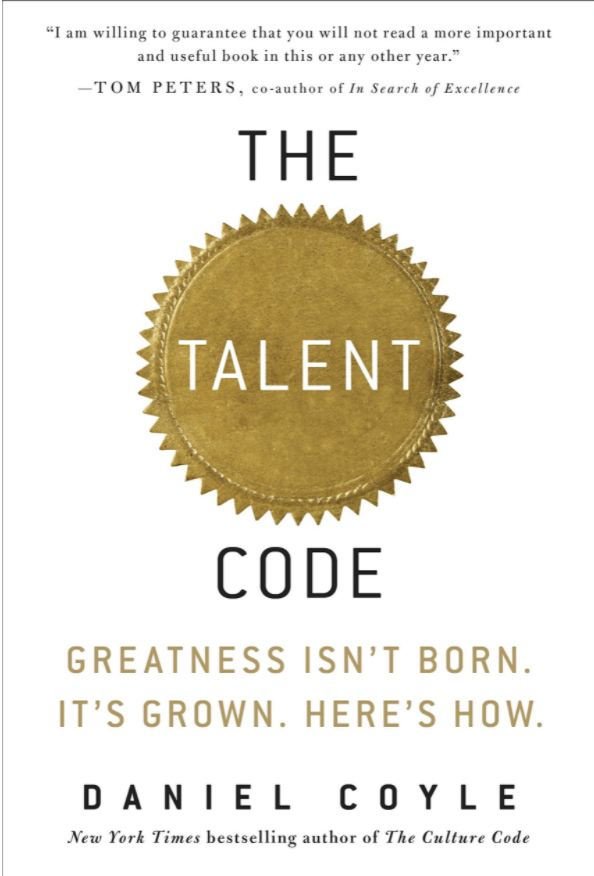Montessori and Contemporary Studies
Daniel Coyle, a journalist based in New York has written a book called, The Talent Code: the greatness isn’t born, it’s grown. I was intrigued by the similarities between his findings regarding growth of talent and Montessori principles, as I read through his very first Chapter ‘The Sweet Spot’.
Coyle begins the first chapter The Sweet Spot, with a German proverb, ‘You will become clever through your mistakes. This hints at what to expect from the chapter and which strikingly corresponds to Montessori’s ‘learning through mistakes’ philosophy, practised in Montessori schools since 1907. The similarity thus started continues to the end of the chapter.
Coyle’s chapter starts as a personal account of a journey and ends by unfolding the critical elements in learning and teaching excellence. Initially, Coyle’s intention was to investigate whether the talent was in-born or nurtured. He claims that half of the time “world-class speed, power and grace” are natural, and the remaining half of the time it was ‘Deep Practice’ (nurture) that produced excellence (2009, p. 12). To establish the argument, he compares the present Brazil, the factory for soccer greatness to the Brazil of 1940s and 1950s, which was nowhere in the World Soccer, despite having all the ingredients of success like “… friendly climate, deep passion for soccer, genetically diverse population of 190 million, 40% of whom are desperately poor …” much like present Brazil. What led Brazil to be a World Champion is the Deep Practice, Coyle argues (2009, p. 15).
In fact, Deep Practice is nothing new for the education world. It is as old as Confucius’s dictum, “I hear, and I forget. I see and I remember. I do and I understand”. However, doing is different from practising. For instance, when a child is learning to walk, he doesn’t ‘do it once but keeps on practising until confident of walking, and then masters by running despite his mother’s caring disruptions (Montessori, 1989). Montessori classrooms adopt this concept and encourage the children to internalize the concepts.
Continuing, Coyle affirms that Deep Practice is built on learning from the mistakes and quotes Robert Bjork, that Deep Practice is a result of ample mental scaffoldings built while generating impulses encountering and overcoming difficulties (2009, p. 19). Coyle endorses Bjork’s concept of ‘The Sweet Spot’, an optimal point between what one knows and what one is trying to do, as the starting point of learning.
The Sweet Spot is analogous to ‘Optimal Experience’, the experience triggered by a good fit between a person’s skills in an activity and the challenges afforded by the environment. (Rathunde, 2003). In Montessori terms, Optimal Experience is ‘Concentration’. Concentration according to her is the concurrence of mental and physical energies (Standing, 1998), and happens only when the child is working with an activity that is neither too challenging nor too easy. It is a point where the child forgets everything around him and gets deeply involved. After concentration, he experiences a serene bliss and sense of achievement (Munireddy, 2011).
Further, describing Deep Practice as a strange concept as the more one practices, the more it becomes his nature, Coyle argues that in contrast to the theory of avoiding mistakes it encourages making mistakes leading to achieving skill. (2009, p. 20).
Montessori discovered this a century ago and based her method on the ‘Learning through mistakes’ (Montessori, 1967a). When the child practices a concept, he discovers many alternatives and imbibes the concept without being directly coached.
Finally, Coyle exemplifies, Edwin Link’s unusual devise and Brazil’s secret weapon: the ‘futebol de salao’ – the soccer in the room. In both examples emphasize deep practice. While Link’s aeroplane model gave enough opportunities for the pilots to land, take off and locate their Sweet Spot without actually flying an aeroplane, the soccer in the room made the players practice in a much smaller room, on a harder surface, facilitating the players move faster and to touch the ball 600 per cent more often than practising on a regular soccer ground. In both cases, the practice was provided in adverse situations.
Similarly, in contrast to the general educational philosophy of teaching little by little with increasing difficulties, in a Montessori classroom, the difficult activities are shown first. This makes the child independent of the teacher in performing the imminent easier activities on his own (Joosten, NY).
Thus, Coyle’s claims are similar to many Montessori principles. While the Deep Practice and learning through mistakes are a day-to-day Montessori phenomenon, Sweet Spot corresponds to Optimal Experience (Concentration) and practising in difficult situations is close to Montessori’s rule of presenting difficult activities first. However, Coyle’s presentation of the familiar concepts in a readable, entertaining yet convincing way with practical demonstrations and pieces of evidence, makes it reachable to a wider audience.
Works Cited
Coyle, D. (2009). The Talent Code. New York: Bantam Dell.
Joosten. (NY). Exercises of Practical Life. Madras: Kalakshetra Publications.
Montessori, M. (1967a). The Absorbent Mind. Madras: Kalakshetra Publications.
Montessori, M. (1989). What you should know about your child. Madras: ABC – CLIO Ltd.
Standing, E. M. (1998). Maria Montessori: Her life and work. New York: Penguin Group.

